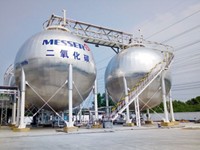Advertisement
Grab your lab coat. Let's get started
Welcome!
Welcome!
Create an account below to get 6 C&EN articles per month, receive newsletters and more - all free.
It seems this is your first time logging in online. Please enter the following information to continue.
As an ACS member you automatically get access to this site. All we need is few more details to create your reading experience.
Not you? Sign in with a different account.
Not you? Sign in with a different account.
ERROR 1
ERROR 1
ERROR 2
ERROR 2
ERROR 2
ERROR 2
ERROR 2
Password and Confirm password must match.
If you have an ACS member number, please enter it here so we can link this account to your membership. (optional)
ERROR 2
ACS values your privacy. By submitting your information, you are gaining access to C&EN and subscribing to our weekly newsletter. We use the information you provide to make your reading experience better, and we will never sell your data to third party members.
Business
Geography plays role in fate of two deals
Linde-Praxair merger is off, PotashCorp-Agrium merger is on, in part due to location issues
by Michael McCoy
September 12, 2016

The chemical industry is as global as they come, but location still matters. An international combination of industrial gases companies was just called off, in part because of disagreement about the location of certain jobs. Meanwhile, a merger of two fertilizer companies is going ahead, eased by the fact that they are both Canadian.
The gases merger, first revealed last month, was to combine U.S.-based Praxair and Germany’s Linde. The new company would have had a global industrial gases market share of about 40% and annual sales of close to $28 billion, making it by far the world’s largest gases firm.
At the time, outside analysts said obtaining antitrust clearances to create the company would present hurdles. But in the end it was questions about who would do what and where that killed the deal.
“While the strategic rationale of a merger has been principally confirmed, discussions about details, specifically about governance aspects, did not result in a mutual understanding,” Linde said in a statement. Published reports say the two firms couldn’t agree on where to house R&D and other functions.
Talks are going more smoothly in Canada, where Potash Corp. of Saskatchewan and Agrium have announced an agreement to combine into what they say will be the world’s largest crop nutrient company. The two firms disclosed the merger talks late last month.
The deal is a stock-based merger of equals that values the combined company at $36 billion. The new firm, to be named later, would have had sales last year of almost $21 billion.
Past deals involving PotashCorp failed in large part because of location. A 2010 hostile takeover attempt by the mining giant BHP Billiton was quashed by the Canadian industry ministry, which argued that the acquisition would not be a net benefit to Canada. Likewise, Germany’s K+S rejected PotashCorp’s 2015 takeover offer in part because it didn’t guarantee protection for the firm’s German workers.
The all-Canadian merger has no such hitches. PotashCorp and Agrim say they will maintain corporate offices in their respective headquarters cities of Saskatoon, Saskatchewan, and Calgary, Alberta. “Our merger creates a new, premier Canadian-headquartered company,” says PotashCorp CEO Jochen Tilk.



Join the conversation
Contact the reporter
Submit a Letter to the Editor for publication
Engage with us on Twitter